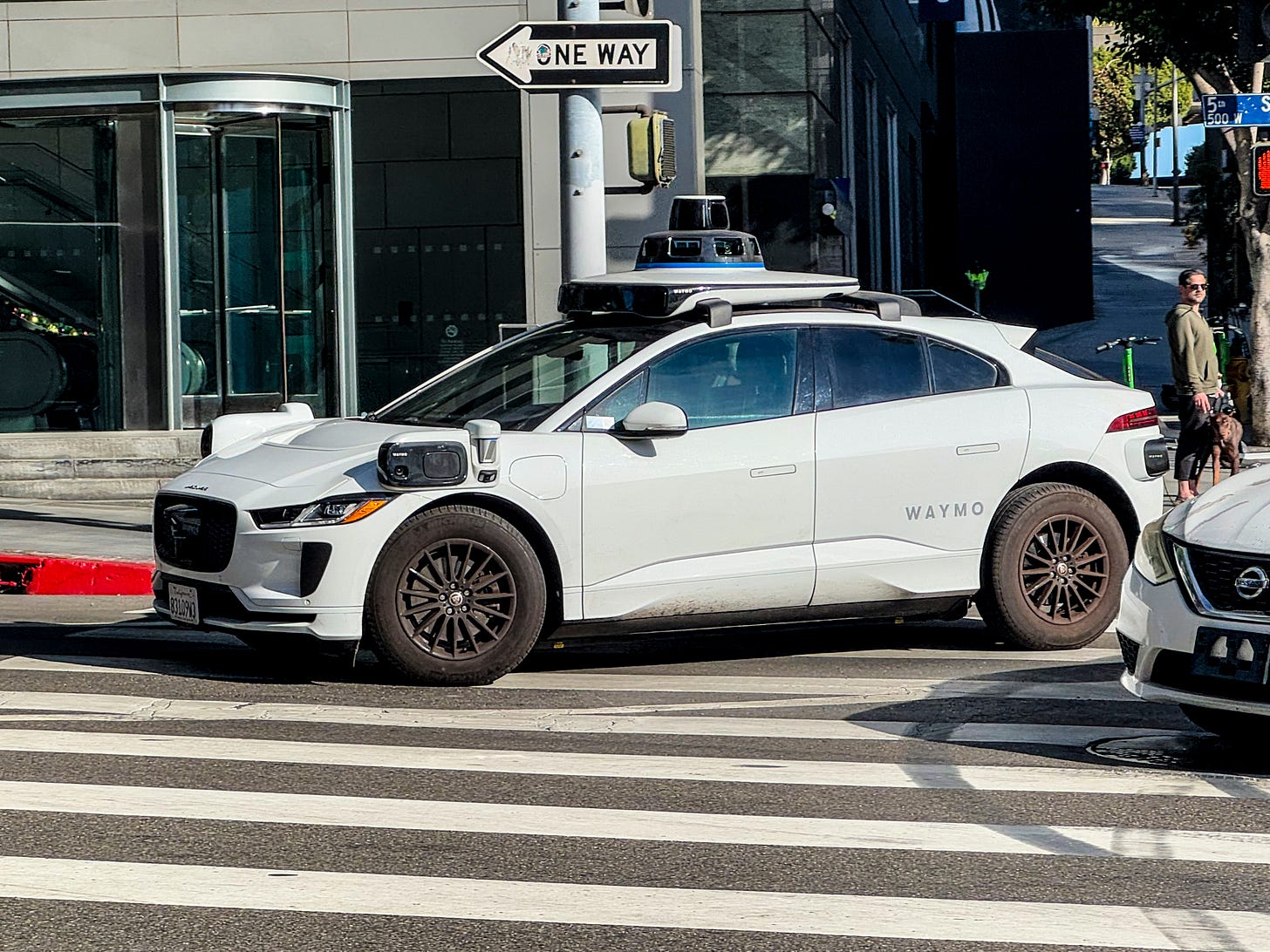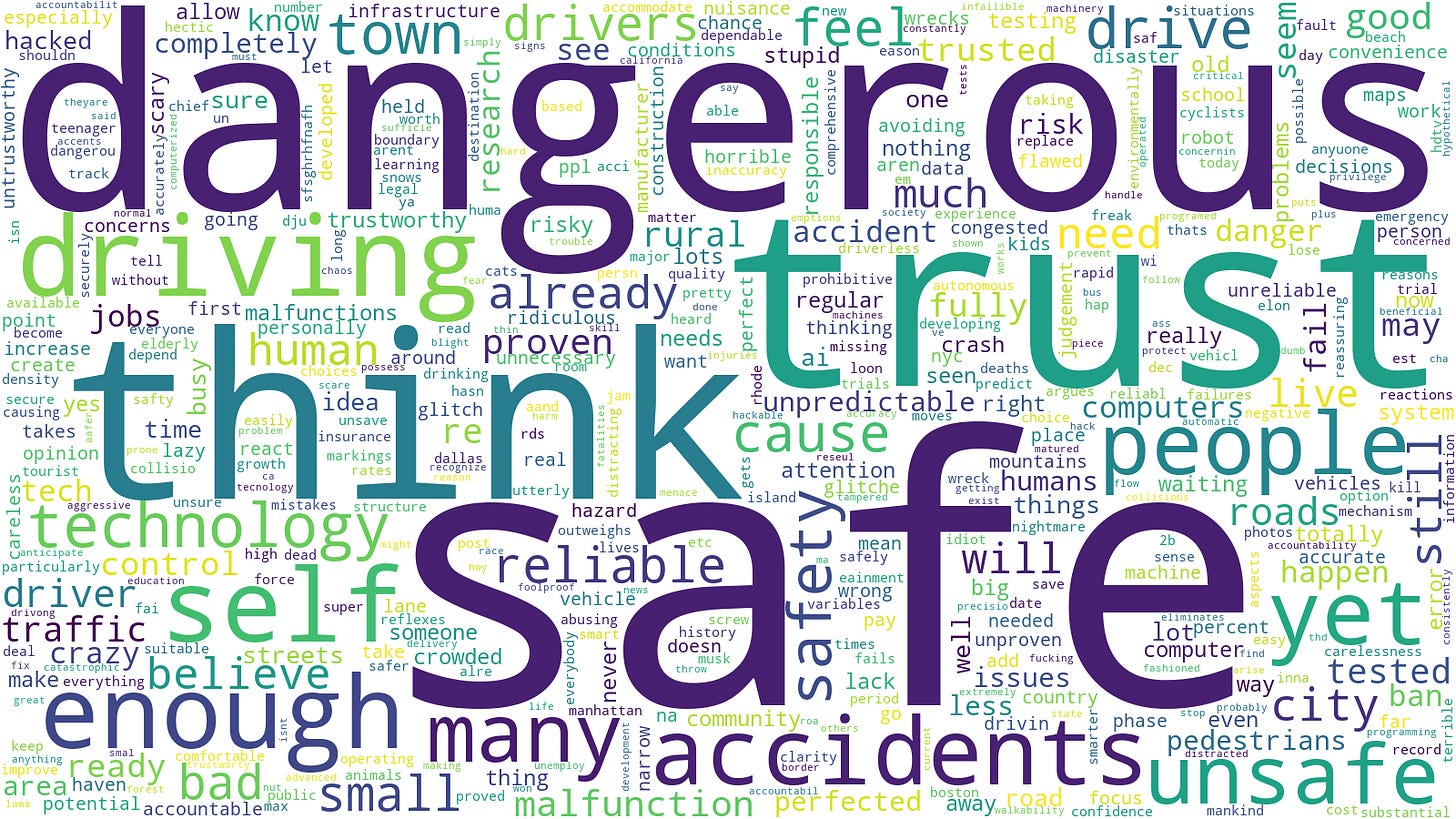Please let the robots have this one
Self-driving cars are way safer than human drivers

Welcome back to The Argument’s monthly poll series, where we press Americans on the issues everyone’s fighting about. Last time it was free speech. This time it’s AI. Our full crosstabs are available for paying subscribers here and our methodology can be read here.
Six weeks ago, a cyclist was struck by a truck and killed six blocks from my home at an intersection where I walk with my kids every Friday. I didn’t hear about it at the time — that sort of thing happens too often to make much news.
But when I sat down to write this article, I knew my lead would be a pointless, tragic death that happened within a few blocks of me within the last few months. There are always plenty to choose from.
Nearly 40,000 Americans died in traffic accidents in 2024. Worldwide, traffic accidents kill more than a million people a year. For young people, traffic accidents are one of the leading causes of death.
If you were to cut U.S. traffic accident deaths by 80%, you would save more than 31,000 lives every year — more lives than you would save if you magically prevented all U.S. homicides. Or all U.S. skin cancer. And all U.S. deaths in childbirth (to be fair, those are pretty rare).
But while no one has a cure for homicide that I’m aware of, we do have a pretty good cure for car accidents: self-driving cars. Safe, considerate to pedestrians, clean, pleasant, and futuristic; self-driving cars are genuinely one of the most exciting things happening in the world of technology today. So, of course, cities have begun debating whether to ban them entirely.
“What we are doing is creating an opportunity for people to choose to not support humans,” Boston City Councilor Julia Mejia said during a tense hearing with Waymo representatives, during which she expressed her “strong opposition” to Waymo operating in Boston. Washington state and Massachusetts have considered initiatives to ban autonomous vehicles unless they have a human driver.
Unsurprisingly, Uber, Lyft, and taxi drivers are going to be opposed to robots automating their jobs. But city councils have obligations to their constituents, and adopting a massively safety-improving technology is one of those cases where they should stand up to the narrow interest groups opposed.
For now, the self-driving car champion is Waymo, owned by Google’s parent company Alphabet. It has thousands around a thousand self-driving cars picking up and dropping off passengers all over San Francisco. Timothy Lee over at Understanding AI regularly takes a close, thoughtful look at Waymo’s incredible safety data, which indicates that Waymos are about 80% less likely to get into a serious crash than human drivers.
Remarkably, this likely understates how many lives could be saved by self-driving cars since most Waymo crashes were the fault of the other driver. According to the Understanding AI team, which reads every serious crash report, of the 30 to 40 crashes in each six-month period they examine, in only one or two was the Waymo at fault — and there have been no fatal crashes that were Waymo’s fault (fatal crashes are rare enough in self-driving cars that you would not necessarily expect any in Waymo’s 100 million miles driven).
It’s dumb to hate the cure for cancer just because AI invented it
In The Argument’s September polling on all things AI, we asked “Do you think your city or town should allow or ban self-driving cars?” Twenty-eight percent wanted to allow them. Forty-one percent wanted to ban them. There were no truly enthusiastic contingencies for self-driving cars — they do a bit better with liberals, younger people, and more educated people, but not a single group has a majority in favor.
By contrast, there’s a large mass of old people that are extremely opposed to self-driving cars, which is especially ironic when you consider that they are also the most likely to cause more likely to die from the very crashes that this technology would protect us from.
When we asked voters why they want to ban self-driving cars, they gave us a range of reasons, which generally boiled down to safety and trust.
Hopefully, the safety concerns will be responsive to the safety data! To most of the country, self-driving cars are still a hypothetical, and I think at least some people will be won over when they see how well these cars drive (as a pedestrian, it’s really notable how they just stop for you at crosswalks!). And there is more support for self-driving cars out West, where they actually exist in significant numbers.
But even in San Francisco where Waymos are a reality, I still run into a lot of Waymo haters. Sometimes they hate the cars for taking jobs from Uber and Lyft drivers. (Though remember how a couple of years ago everyone wanted to ban Uber and Lyft?) Sometimes they hate the cars out of vague anti-corporate sentiment. But often, what they really hate isn’t Waymo at all.
A Waymo is often seen as a physical-world embodiment of the flood of AI slop replacing high-quality artwork and filling social media feeds with fake nonsense. That quiet, whirring car is a reminder that the once-useful assumption that a lengthy written text had required some human to apply serious thought at some point is now no longer valid. But you can’t vandalize ChatGPT, so anti-AI sentiment finds its expression in harassing Waymos.
This is absurd. You are welcome to hate AI. I believe that the AI companies trying to build superintelligence absolutely should not be allowed to do that. So I’m pretty much with you. But you shouldn’t hate a cure for cancer just because AI invented it, and autonomous vehicles will save more people than a cure for most cancers.1
And it’s not just the calculus of deaths prevented. Self-driving cars, like laundry machines, dishwashers, and other labor-saving devices before them, enable humans to spend their time doing more of what they like.
Autonomous vehicles can drop your kids off at soccer practice without you — making it way more viable to be a parent with multiple kids in different extracurriculars. They can allow people without a driver’s license to fully participate in society in the many parts of our country where that requires a car. They can reduce the stress of a frustrating commute to actual meaningful time spent reading, talking with your family, or just getting work done.
Self-driving cars can even help fix our built environment: No more fighting over parking spots, no more building giant, expensive concrete parking garages when so many cars can just drop people off and then be recalled later.
Yes, the washing machine took a lot of people’s jobs — but it was worth it!
Unemployment is low right now — when productivity goes up (for example, because we added Waymos to the streets), we are freeing up human labor to be spent on other tasks, not condemning Lyft and Uber drivers to perpetual unemployment. And Lyft and Uber are not good jobs — if you account for the depreciation of cars, they pay way less than minimum wage.
These are not jobs it makes sense to be protectionist about. As for concerns about autonomous vehicles increasing congestion, by all means, let’s price congestion — but not ban it.
Allowing self-driving cars doesn’t mean banning human drivers
Due to the curse of zero-sum thinking, our debates perpetually lurch between “this is bad and must be banned” and “this is good and must be mandatory.” But it is actually possible for the government to allow something good without requiring its use.
Many people like the freedom of driving their own car — no software, no cameras around all sides, no intermediation by a major international corporation — and they are scared that as soon as Waymos are safer than human drivers, we will take their cars away.
This seems simple to fix: Let’s not do that. We do not need to deny good drivers the freedom to drive down the U.S. 101 blasting the new Taylor Swift album to their hearts’ delight.
I will readily admit that I think some people should not be allowed to drive. Right now, some courts hesitate to strip a repeat drunk or reckless driver of their license because it’s their only way to get to work, get groceries, or care for their kids. Once we have self-driving cars, we won’t have to choose between ruining their lives and letting them stay behind a wheel they cannot operate responsibly.
Similarly, we frequently don’t take licenses away from elderly people who are no longer safe on the road because we feel bad about the curtailment of their freedom and flexibility this entails. Once we have self-driving cars, we can be far more serious about requiring everyone to be a safe driver if they want to be a driver.
But talking to people, some of the resistance to Waymo is the fear we’ll lurch straight from “permitted” to “required.” And there are plenty of safe, responsible drivers out there. So I want to plant my banner here: You can have your big truck! Just let us have our gloriously safe, smooth, efficient, convenient beetle-shaped objects. And let us have our neighbors, who car accidents keep taking from us.
Correction: An earlier version of this article misidentified the most-likely age group to cause car accidents and misstated the number of Waymos operating in San Francisco.
Traffic accidents are neck and neck with breast cancer and prostate cancer, and behind only lung cancer and colorectal cancer.




I really wish some of these rah-rah self-driving cars articles would acknowledge that while self-driving cars are great WHEN THEY WORK, there are still huge obstacles to making them work outside of areas like San Francisco that have easy driving weather and have been mapped and ring-fenced to within an inch of their lives. We're still a long way from when you can get in a self-driving car in Grand Rapids, Michigan in January and ask it to take you up to the Ferris State University campus in Big Rapids. These things are currently best thought of as a new form of public transit in certain large cities, not as a genuine replacement for the uses for which the vast majority of American drivers need a car.
“they are scared that as soon as Waymos are safer than human drivers, we will take their cars away.”
This is a common fear that leads people to resist technological and social change, and arguably liberalism more broadly. Some other versions of this fear I’ve seen:
- Zoning reform means banning single family homes.
- Incentivizing electric cars means taking away your ICE car.
- Accepting gay and trans people means everyone will be pressured to identify as queer or nonbinary in some way, and to reject heterosexuality and traditional families.
It’s basically “allowing a new thing will mean the old thing will be banned or heavily socially sanctioned”. I won’t say this fear is never rational, but most cases I’ve seen have been.